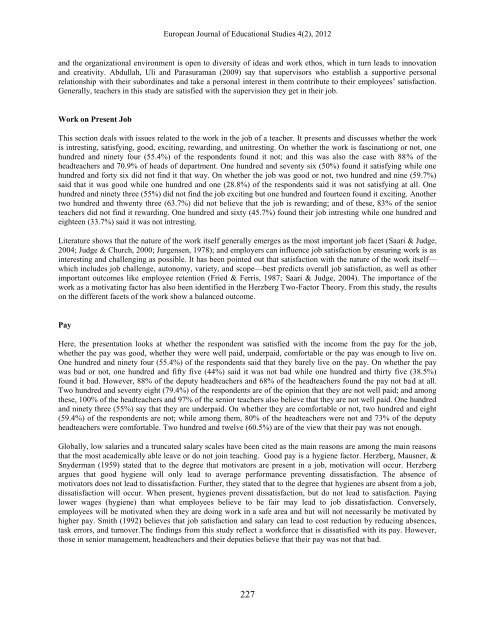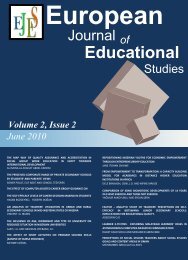the level of the job satisfaction of teachers in botswana pedzani ...
the level of the job satisfaction of teachers in botswana pedzani ...
the level of the job satisfaction of teachers in botswana pedzani ...
You also want an ePaper? Increase the reach of your titles
YUMPU automatically turns print PDFs into web optimized ePapers that Google loves.
European Journal <strong>of</strong> Educational Studies 4(2), 2012<br />
and <strong>the</strong> organizational environment is open to diversity <strong>of</strong> ideas and work ethos, which <strong>in</strong> turn leads to <strong>in</strong>novation<br />
and creativity. Abdullah, Uli and Parasuraman (2009) say that supervisors who establish a supportive personal<br />
relationship with <strong>the</strong>ir subord<strong>in</strong>ates and take a personal <strong>in</strong>terest <strong>in</strong> <strong>the</strong>m contribute to <strong>the</strong>ir employees‘ <strong>satisfaction</strong>.<br />
Generally, <strong>teachers</strong> <strong>in</strong> this study are satisfied with <strong>the</strong> supervision <strong>the</strong>y get <strong>in</strong> <strong>the</strong>ir <strong>job</strong>.<br />
Work on Present Job<br />
This section deals with issues related to <strong>the</strong> work <strong>in</strong> <strong>the</strong> <strong>job</strong> <strong>of</strong> a teacher. It presents and discusses whe<strong>the</strong>r <strong>the</strong> work<br />
is <strong>in</strong>trest<strong>in</strong>g, satisfy<strong>in</strong>g, good, excit<strong>in</strong>g, reward<strong>in</strong>g, and unitrest<strong>in</strong>g. On whe<strong>the</strong>r <strong>the</strong> work is fasc<strong>in</strong>ationg or not, one<br />
hundred and n<strong>in</strong>ety four (55.4%) <strong>of</strong> <strong>the</strong> respondents found it not; and this was also <strong>the</strong> case with 88% <strong>of</strong> <strong>the</strong><br />
head<strong>teachers</strong> and 70.9% <strong>of</strong> heads <strong>of</strong> department. One hundred and seventy six (50%) found it satisfy<strong>in</strong>g while one<br />
hundred and forty six did not f<strong>in</strong>d it that way. On whe<strong>the</strong>r <strong>the</strong> <strong>job</strong> was good or not, two hundred and n<strong>in</strong>e (59.7%)<br />
said that it was good while one hundred and one (28.8%) <strong>of</strong> <strong>the</strong> respondents said it was not satisfy<strong>in</strong>g at all. One<br />
hundred and n<strong>in</strong>ety three (55%) did not f<strong>in</strong>d <strong>the</strong> <strong>job</strong> excit<strong>in</strong>g but one hundred and fourteen found it excit<strong>in</strong>g. Ano<strong>the</strong>r<br />
two hundred and thwenty three (63.7%) did not believe that <strong>the</strong> <strong>job</strong> is reward<strong>in</strong>g; and <strong>of</strong> <strong>the</strong>se, 83% <strong>of</strong> <strong>the</strong> senior<br />
<strong>teachers</strong> did not f<strong>in</strong>d it reward<strong>in</strong>g. One hundred and sixty (45.7%) found <strong>the</strong>ir <strong>job</strong> <strong>in</strong>trest<strong>in</strong>g while one hundred and<br />
eighteen (33.7%) said it was not <strong>in</strong>trest<strong>in</strong>g.<br />
Literature shows that <strong>the</strong> nature <strong>of</strong> <strong>the</strong> work itself generally emerges as <strong>the</strong> most important <strong>job</strong> facet (Saari & Judge,<br />
2004; Judge & Church, 2000; Jurgensen, 1978); and employers can <strong>in</strong>fluence <strong>job</strong> <strong>satisfaction</strong> by ensur<strong>in</strong>g work is as<br />
<strong>in</strong>terest<strong>in</strong>g and challeng<strong>in</strong>g as possible. It has been po<strong>in</strong>ted out that <strong>satisfaction</strong> with <strong>the</strong> nature <strong>of</strong> <strong>the</strong> work itself—<br />
which <strong>in</strong>cludes <strong>job</strong> challenge, autonomy, variety, and scope—best predicts overall <strong>job</strong> <strong>satisfaction</strong>, as well as o<strong>the</strong>r<br />
important outcomes like employee retention (Fried & Ferris, 1987; Saari & Judge, 2004). The importance <strong>of</strong> <strong>the</strong><br />
work as a motivat<strong>in</strong>g factor has also been identified <strong>in</strong> <strong>the</strong> Herzberg Two-Factor Theory. From this study, <strong>the</strong> results<br />
on <strong>the</strong> different facets <strong>of</strong> <strong>the</strong> work show a balanced outcome.<br />
Pay<br />
Here, <strong>the</strong> presentation looks at whe<strong>the</strong>r <strong>the</strong> respondent was satisfied with <strong>the</strong> <strong>in</strong>come from <strong>the</strong> pay for <strong>the</strong> <strong>job</strong>,<br />
whe<strong>the</strong>r <strong>the</strong> pay was good, whe<strong>the</strong>r <strong>the</strong>y were well paid, underpaid, comfortable or <strong>the</strong> pay was enough to live on.<br />
One hundred and n<strong>in</strong>ety four (55.4%) <strong>of</strong> <strong>the</strong> respondents said that <strong>the</strong>y barely live on <strong>the</strong> pay. On whe<strong>the</strong>r <strong>the</strong> pay<br />
was bad or not, one hundred and fifty five (44%) said it was not bad while one hundred and thirty five (38.5%)<br />
found it bad. However, 88% <strong>of</strong> <strong>the</strong> deputy head<strong>teachers</strong> and 68% <strong>of</strong> <strong>the</strong> head<strong>teachers</strong> found <strong>the</strong> pay not bad at all.<br />
Two hundred and seventy eight (79.4%) <strong>of</strong> <strong>the</strong> respondents are <strong>of</strong> <strong>the</strong> op<strong>in</strong>ion that <strong>the</strong>y are not well paid; and among<br />
<strong>the</strong>se, 100% <strong>of</strong> <strong>the</strong> head<strong>teachers</strong> and 97% <strong>of</strong> <strong>the</strong> senior <strong>teachers</strong> also believe that <strong>the</strong>y are not well paid. One hundred<br />
and n<strong>in</strong>ety three (55%) say that <strong>the</strong>y are underpaid. On whe<strong>the</strong>r <strong>the</strong>y are comfortable or not, two hundred and eight<br />
(59.4%) <strong>of</strong> <strong>the</strong> respondents are not; while among <strong>the</strong>m, 80% <strong>of</strong> <strong>the</strong> head<strong>teachers</strong> were not and 73% <strong>of</strong> <strong>the</strong> deputy<br />
head<strong>teachers</strong> were comfortable. Two hundred and twelve (60.5%) are <strong>of</strong> <strong>the</strong> view that <strong>the</strong>ir pay was not enough.<br />
Globally, low salaries and a truncated salary scales have been cited as <strong>the</strong> ma<strong>in</strong> reasons are among <strong>the</strong> ma<strong>in</strong> reasons<br />
that <strong>the</strong> most academically able leave or do not jo<strong>in</strong> teach<strong>in</strong>g. Good pay is a hygiene factor. Herzberg, Mausner, &<br />
Snyderman (1959) stated that to <strong>the</strong> degree that motivators are present <strong>in</strong> a <strong>job</strong>, motivation will occur. Herzberg<br />
argues that good hygiene will only lead to average performance prevent<strong>in</strong>g dis<strong>satisfaction</strong>. The absence <strong>of</strong><br />
motivators does not lead to dis<strong>satisfaction</strong>. Fur<strong>the</strong>r, <strong>the</strong>y stated that to <strong>the</strong> degree that hygienes are absent from a <strong>job</strong>,<br />
dis<strong>satisfaction</strong> will occur. When present, hygienes prevent dis<strong>satisfaction</strong>, but do not lead to <strong>satisfaction</strong>. Pay<strong>in</strong>g<br />
lower wages (hygiene) than what employees believe to be fair may lead to <strong>job</strong> dis<strong>satisfaction</strong>. Conversely,<br />
employees will be motivated when <strong>the</strong>y are do<strong>in</strong>g work <strong>in</strong> a safe area and but will not necessarily be motivated by<br />
higher pay. Smith (1992) believes that <strong>job</strong> <strong>satisfaction</strong> and salary can lead to cost reduction by reduc<strong>in</strong>g absences,<br />
task errors, and turnover.The f<strong>in</strong>d<strong>in</strong>gs from this study reflect a workforce that is dissatisfied with its pay. However,<br />
those <strong>in</strong> senior management, head<strong>teachers</strong> and <strong>the</strong>ir deputies believe that <strong>the</strong>ir pay was not that bad.<br />
227

















